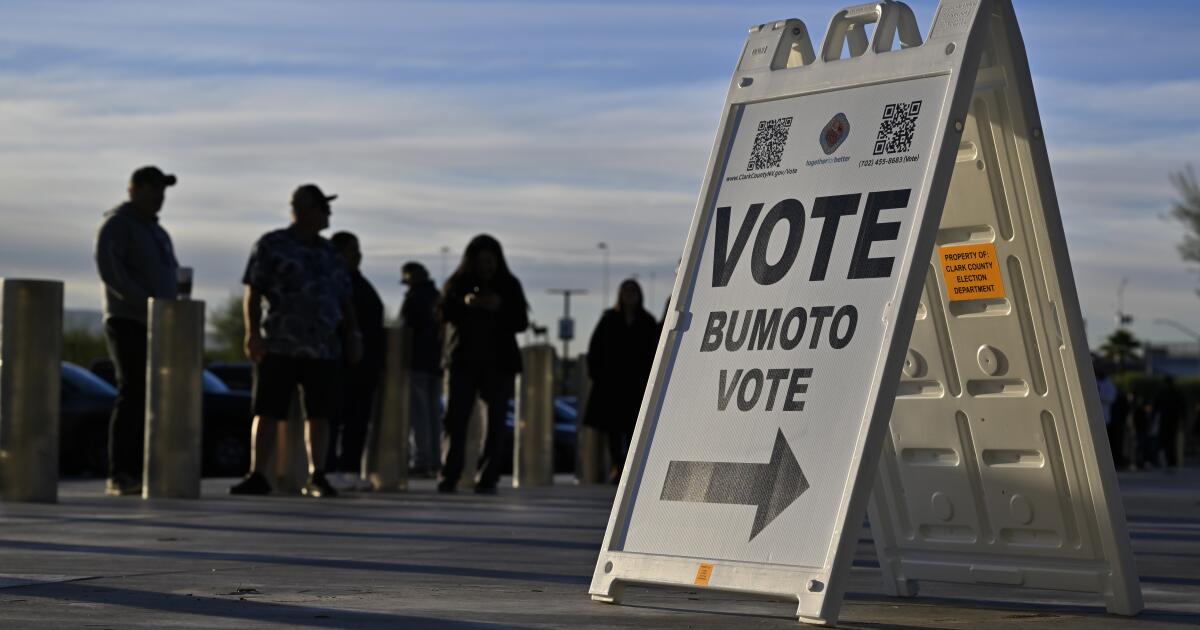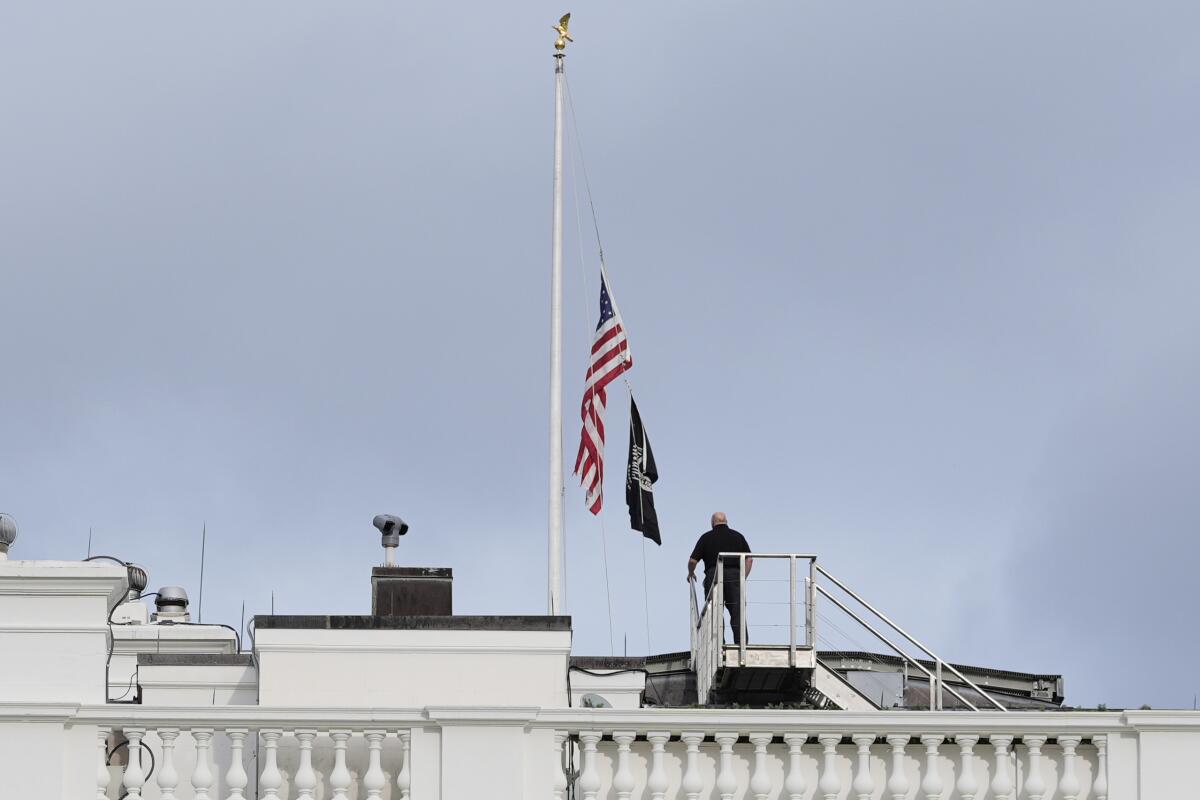Column: Is it really an election if there’s only one candidate?
There are three essential components to a healthy democracy: elected officials, voters and political opposition. The first two make the most noise and get the most attention.
But that third pillar really matters too.
According to Ballotpedia, the online nonpartisan organization that tracks election data, of the nearly 14,000 elections across 30 states that the group covered this week, 60% were uncontested — with only one candidate for a position, or for some roles, no candidate at all.
Much of this week’s postelection analysis has been focused on the mayoral race in New York City and Zohran Mamdani’s victory. Yet the same night, as democracy in America took center stage, more than 1,000 people were elected mayor without facing an opponent.
Only about 700 mayoral races tracked by Ballotpedia gave voters any choice. Dig a little deeper and you find more than 50% of city council victories and nearly 80% of outcomes for local judgeships were all without competition.
That’s a problem.
Elections without political opposition turn voting — the cornerstone of our governance — into performance art. The trend is heading in the wrong direction. Since Ballotpedia began tracking this data in 2018, about 65% of the elections covered were uncontested. However, for the last two years the average is an abysmal 75%.
It’s a symptom of broader disengagement. Over two and a half centuries, a lot of lives have been sacrificed trying to perfect this union and its democracy. And yet last November, a third of America’s eligible voters chose not to take part.
Are we a healthy democracy or masquerading as one?
Doug Kronaizl, a managing editor at Ballotpedia who analyzes this data, told me the numbers show Americans are increasingly more focused on national politics, even though local elections have the greatest effects on our daily lives.
“We like to view elections sort of like a pyramid, and at the tippity top, that’s where all of the elections are that people just spend a lot of time focused on,” said Kronaizl, who’s been at the nonprofit since 2020. “That’s your U.S. House races, your governor races, stuff like that. But the vast majority of the pyramid — that huge base — is like all of these local elections that are always happening and end up being for the most part uncontested.”
Take New York, for example. For all the hoopla around Mamdani’s win, the fact is most of the state’s 124 elections weren’t contested. Iowa had 1,753 races with one or zero candidates; Ohio had more than 2,500.
And that’s being conservative. In some cases, if an election is uncontested, ballots aren’t printed and the performance art is canceled. Ballotpedia says its data doesn’t include outcomes decided without a vote.
We have elected officials. We have voters. But political opposition? We’re in trouble — especially at the local level, down at the base of the pyramid. The foundation of democracy is in desperate need of repair.
* * *
The former mayor of Tempe, Ariz., Neil Giuliano, has dedicated most of his life to public service. He said when it comes to running for office, people must remember the three M’s: the money to campaign, the electoral math to win and the message for voters.
“It used to be the other way around,” he told me. “It used to be you had a message and you talked about what you believed in.” Now, however, “you can talk about what you believe in all day long,” he said, but if you don’t have the money and the data to target and reach voters, “it’s either a vanity effort or a futility effort.”
When an interesting electoral seat opens in Arizona, Giuliano — who was elected to the city council in 1990 before serving as mayor from 1994 to 2004 — is sometimes approached about running again. For two decades now, his answer has been the same: No, thank you.
Instead, the 69-year-old prefers mentoring candidates and fundraising. He also sits on the board of the Victory Fund, the 30-year-old nonpartisan organization that works to elect openly LGBTQ+ candidates at all levels of government.
Giuliano said the rise in uncontested elections can be explained by two discouraged groups: Some people don’t run because they believe the positions don’t matter. Others are “so overwhelmed with everything going on they’re not going to alter their life,” he said. “It’s already challenging enough without getting into a public fray where people hate each other, where people need security, where people are being accosted verbally and on social media.”
That sentiment was echoed by Amanda Litman, co-founder and president of Run for Something. Her nonprofit recruits and supports young progressives to run for local and state offices. Since President Trump was elected last November, Litman said, the organization has received more than 200,000 inquiries from people looking to run for office — which could indicate some hope on the horizon.
“I think the problems have gotten so big and so deep that it feels like you have to do something — you have to run,” she said. “The number one issue we’re hearing folks talk about is housing. The market in the last couple of years has gotten so hard, especially for young people, that it feels like there’s no alternative but to engage.”
* * *
Indeed, these are the times that try men’s souls, to borrow a phrase from Thomas Paine. He wrote those words in “The American Crisis” less than two years into the Revolutionary War, when morale was low and the future of democracy looked bleak. It is said that George Washington had Paine’s words read out loud to soldiers to inspire them. And when the bloodshed was over and victory finally won, the founders drafted the first article of the Bill of Rights because they knew the paramount importance of political opposition. That is what the 1st Amendment primarily protects: freedom of speech, the press and assembly and the right to petition the government.
Today, the crisis isn’t tyranny from abroad, but civic disengagement.
And look, I get it.
Whether you watch Fox News, CNN or MSNBC, it usually seems as though no one in politics cares about you or your community’s problems. We would have a different impression if we listened to local candidates. There are thousands of local elections every year, starving for attention and resources, right at the base of the pyramid. Since the 20th century — when national media and campaign financing exploded — we have been lured into looking only at the tippity top.
One reason political opposition in local races is critical to democracy is that it teaches us to get along despite our differences. The president will never meet most people who didn’t vote for them, but a local school board member might. Those conversations will affect how the official thinks, talks, campaigns and governs. When the system works, politicians are held accountable — and are replaced if they get out of step with voters. That’s a healthy democracy, and it’s possible only with all three elements in place: elected officials, voters and political opposition.
* * *
Former Los Angeles Mayor Antonio Villaraigosa has dedicated most of his life to public service. He said he learned early on to care about his community because he grew up during the civil rights movement, “when they were sending dogs to attack human beings.”
Today, the 72-year-old is a 2026 gubernatorial candidate in California. He told me when it comes to the rise in uncontested elections, people have to remember “democracy is a living, breathing thing.”
“Not everybody can run for office, not everybody wants to run for office, but everybody needs to be involved civically,” he said. “We have an obligation and a duty to participate, to read about what’s going on to understand and yes sometimes to run when necessary.
“We got to stand up to the threat to our democracy, but we also got to fix the things we broke … and it’s a lot broken.”
Voters often want something better than the status quo, but without political opposition on the ballot, it can’t happen. That’s the beauty of democracy: It comes in handy when elected officials forget government is meant to serve the people — not the other way around.
Leanna Hubers contributed to this report. YouTube: @LZGrandersonShow

